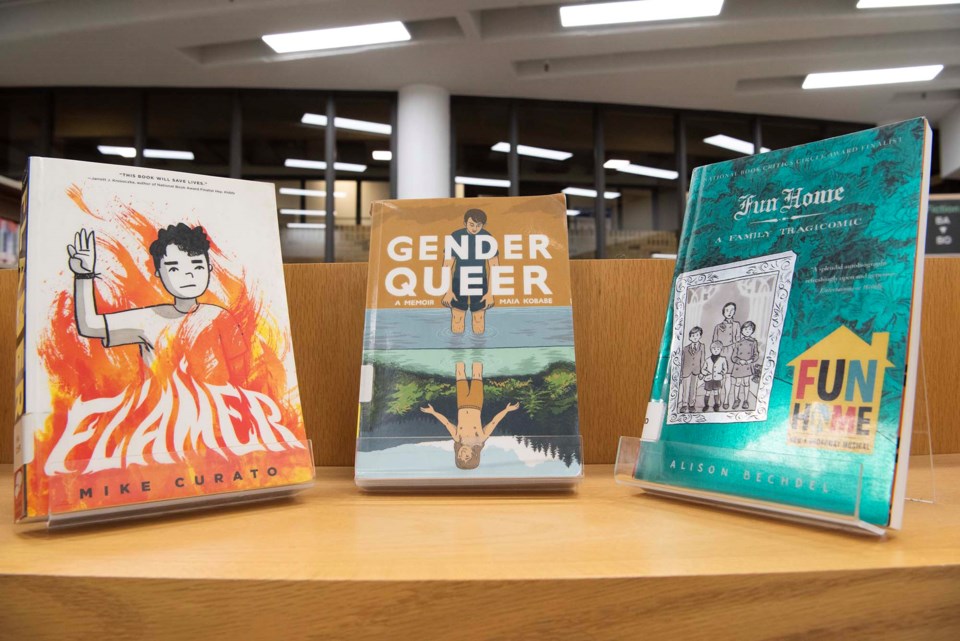St. Albert’s school divisions are reviewing how new provincial guidelines, requiring the removal of sexually explicit content from all school libraries by October, will affect their schools, with both boards saying they have not received any complaints about inappropriate materials.
The Government of Alberta has introduced new guidelines requiring all school libraries to remove sexually explicit materials by Oct. 1, 2025.
Shanlyn Cunningham, spokesperson for Greater St. Albert Catholic Schools (GSACRD), said the division already follows a careful process for selecting age-appropriate, relevant materials that align with its Catholic values.
"Our practices are guided by our Library Program Policy and Library Selection Guidelines, which support the intellectual, moral, and spiritual development of our students," said Cunningham.
John Allan, board chair for St. Albert Public Schools, said in an emailed statement the timeline outlined in the order presents some challenges.
"The new requirement for teachers to catalogue classroom-based libraries by Oct. 1 is burdensome," said Allan, with September already a busy time for teachers who are connecting with their students and families. "Creating a catalogue of potentially hundreds of books during this crucial month will add significant and unnecessary pressure on teachers and educational assistants."
The division plans to present a draft policy at its September public board meeting to meet the government's Jan. 1, 2026, deadline.
He also raised concerns about the impact on library staff, who are already busy in September with distributing textbooks and technology.
"Conducting a shelf-by-shelf review of books during our busiest month will add a considerable amount of work for them," said Allan.
Allan said St. Albert Public Schools has not received any reports of inappropriate material in its school libraries and emphasized the division's trust in its staff to make appropriate decisions.
"We rely on the professional judgment of our library staff around the age-appropriateness and accessibility of materials in our libraries," he said. "At this time, we have no reports of inappropriate material in any of our school libraries."
GSACRD also said it has no reports of sexually explicit materials in their library, including the four graphic novels that were brought to Nicolaides' attention in May.
The new rules
At a news conference on July 10, Education and Childcare Minister Demetrios Nicolaides said before the ministerial order, there were "zero standards for selecting age-appropriate books for libraries."
"This policy gives clear direction for school boards, teachers and school staff, and provides greater assurances to parents about the kinds of material available to children in school libraries," Nicolaides said.
Books with explicit sexual content will be banned for all grades. According to the order, this includes materials with detailed and clear depictions of sexual acts, including masturbation, penetration and ejaculation.
Students in Grade 9 and below will not be able to access any library material with explicit or non-explicit sexual content. Non-explicit content includes any depiction of a sexual act that is not detailed or clear.
Students in Grade 10 and above may access material with non-explicit sexual content if it is deemed developmentally appropriate for them.
Non-sexual material that contains information on puberty, menstruation, pregnancy, breastfeeding, biological functions, textbook material, kissing or hand holding will be available to all students. The order will not apply to materials selected by teachers as part of their curriculum or religious materials, including the Bible.
School boards will also need to create or update plans and policies by Jan. 1, 2026.
Nicolaides said the order is not about banning books or erasing narratives, but about ensuring that young students are not exposed to inappropriate content.
The policy stems from an announcement Nicolaides made in May, when it was reported four graphic novels the province deemed inappropriate were found in school libraries in Edmonton and Calgary.
Educational, library professionals voice concerns
St. Albert Public Library CEO Peter Bailey criticized the order, saying it is a ban on books and the real issue facing school libraries is a lack of support.
"The only crisis that is happening with Alberta school libraries is the lack of funding and the lack of professionals in school libraries," said Bailey.
He said decisions on what children read should be left to their parents and decisions related to what is on the shelves at the school library should be left to professionals.
"Each parent has the fundamental right to monitor their own child's reading," Bailey said. "They don't have the right to control any other parents' children's reading. Decisions about school library books are best left with the professionals in the schools, the educators, the library workers."
Alberta Teachers' Association president Jason Schilling said he does not support the ministerial order. He said it will lead to the removal of valuable and inclusive resources from school libraries.
"This ministerial order accomplishes little other than adding to teacher workload, politicizing a non-issue and targeting vulnerable students," said Schilling in a statement. "It's also an overreaction that highlights a lack of resources for school libraries and the fact that our schools cannot afford to employ teacher-librarians to create, curate and coordinate library resources to support student learning in age- and grade-appropriate ways."
Schilling said the order could discourage teachers from bringing in engaging materials and send a negative message to students exploring their identities.
"Ultimately, it will have a chilling effect on our schools and signal to students who are coming to understand themselves that some expressions of their gender and sexual identities are shameful and should be hidden away," said Schilling.




